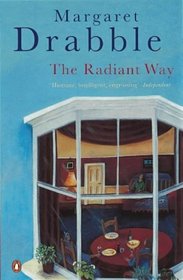One cannot read Drabble (The Ice Age) without being aware of the culture in which she writes; her novels are as much social and political commentary as they are acute character studies. This latest work gives us another grim picture of Britain in the '80s, a country still preoccupied with class divisions, increasingly torn by labor strife, being sucked into the chaos of random violence. The ironic title comes from a children's reading primer, which pictures a world proceeding in rational, peaceful, cooperative fashion; it is also the title of a TV documentary made by Charles Headleand, the husband of one of the three protagonists, all of whom met at Cambridge in the '50s. Liz Headleand is a Harley Street psychotherapist and mother of a large family; Alix Bowen teaches "the poor, the dull and the subnormal" in government sponsored programs; Esther Breuer is an art scholar who has pared her life to minimal terms. Among them these women experience divorce, the death of a parent and of a lover, the loss of a job and a resulting sense of dislocation, an intimation of vulnerability as a ghastly murder affects their lives. In the course of the five-year span of the novel, each comes to terms with her own nature, and with her future. As exemplars of female roles in modern culture and as reflectors of the forces fragmenting British society, Drabble's characters sometimes sound like spokespersons for her pessimistic philosophy, and there are sections of the novel where pure exposition weakens the narrative tension. On the whole, however, this is one of the best of Drabble's books, immersing the reader in a credible, relevant world.
Three British women have been friends since their days at Cambridge. Now they face decisions and adjustments in their adult lives.




